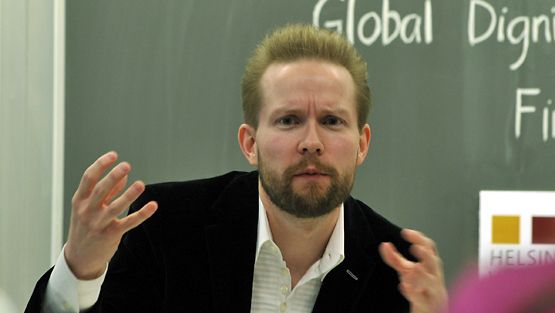A Concise Review Of The “2004 Information Society Report To The Parliament Of Finland By Pekka Himanen” (week 4)
Review Of The “2004 Information Society report to the Parliament of Finland by Pekka
Himanen”[1]
According
to my searches on Wikipedia[2], Pekka Himanen is a Finnish philosopher. He studied
philosophy at the University of Helsinki. I must admit that this pdf was an
extremely interesting read and I admire the brilliance of Dr Pekka Himanen. It
is absolutely stunning the problems that he brings up in this document and to
take the time to draft such a document to submit to the parliament is
honourable, Dr Himanen has earned my utmost respect and reading the document is
enough to understand that why Dr Himanen is the youngest person in Finland to
ever receive a doctorate degree at the tender age of 21.
“The
future of welfare society is in creativity”
Dr Himanen talks about what he thinks the future holds for Finland, a country that follows the European model for success lacking a creative economy and against the entire world in the tax competition to try and attract foreign expertise. A country with an aging population that keeps increasing indefinitely and surely adding pressure to the welfare economy of Finland. Dr Himanen proposes a new model that strives for 10 ideals to prevent the failure of Finland from succeeding in a new world where old wisdom doesn’t hold it’s value. As Dr Himanen says:
- Confidence
- Caring
- Communality
- Encouragement
- Freedom
- Creativity
- Courage
- Visionariness
- Balance
- Meaningfulness
Dr
Himanen believes that there is a pyramid of ideals which puts visionariness at
the top and caring at the bottom with the bottom representing what is most
needed. He believes that a country that is ruled with these ideals will have
people that are free from fear, who have a sense of belonging, are independent,
creative and live with hope. He also preaches for the sake of the rising
pensioner population for the country to invest itself into gerontology so that
the elderly will be able to participate in the creative economy as
participating members of society.
However,
to really understanded Dr Himanen, we have to understand what he means when he
mentions the creative economy in his texts and why it is important. The reason
why Dr Himanen keeps emphasizing the creative economy because he believes that
it is necessary to participate in it to have a future and that those who do not
will be replaced by someone cheaper somewhere else. It is the result of
innovation that creates new ideas and products and thinks of ways to sell them
efficiently in brilliant ways never thought of before. The creative
economy/creative class consists of jobs that usually rely on innovation or creativity
i.e. professions like musicians, television/film stars/directors, authors,
YouTube creator, designers, architects, doctors, analysts, managers etc.
As
we read further into the document, it becomes clear why Dr Himanen stresses on
the 10 values. He wants it to be everything that is Finnish, as Finland is a
welfare state, it does not generate welfare through the taxation rate, but on
taxation on how productive people are. To have a negative working environment
which is dull, fearful and controlling would not make an optimal workforce, to
have the opposite i.e. to have the 10 ideals and to give people innovative
freedom would help people find some meaning in their work or at least not make
it feel meaningless. It would also convince employees to stay in their country
and attract talent from abroad. Dr Himanen believes that creativity should
always be rewarded in the workplace as it saves time and gives employees an
incentive to actually be creative. This should also be the case in the schools
too to promote this at a young age.
Essentially,
Dr Himanen proposes to the parliament a guide on how to optimise the workplace
by introducing creativity because creativity is the future of welfare economies
but also because a welfare society depends heavily on the productivity of it’s
workers.
Sources:
- https://web.archive.org/web/20170221105053/https://www.eduskunta.fi/FI/tietoaeduskunnasta/julkaisut/Documents/tuvje_1+2004.pdf [1]
- https://en.wikipedia.org/wiki/Pekka_Himanen [2]



Comments
Post a Comment